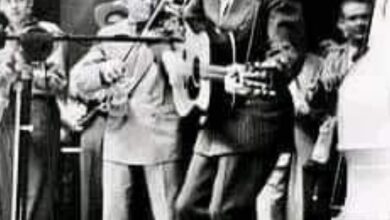The Emotional Weight of Johnny Cash’s Final Concert
Johnny Cash’s final live performance on July 5, 2003, at the Carter Family Fold in Hiltons, Virginia, remains a deeply moving and symbolic event in the history of American music. Held just two months before his death, this performance was a poignant reflection of Cash’s enduring legacy and his profound connection with his audience.
Despite his frailty and being wheelchair-bound, Cash managed to deliver a heartfelt and intimate 30-minute set that showcased his resilience and unwavering passion for music. The performance was carefully curated with some of Cash’s most iconic songs, including “Folsom Prison Blues,” “I Walk the Line,” “Sunday Mornin’ Comin’ Down,” “Ring of Fire,” “Angel Band,” “Big River,” and “Understand Your Man.” Each selection was a testament to Cash’s extensive career and the personal experiences that shaped his music, especially poignant given his recent loss of his beloved wife, June Carter Cash, who had passed away in May 2003.
The emotional weight of the performance was particularly evident during Cash’s rendition of “Ring of Fire,” which he dedicated to June Carter Cash. His words about June’s spirit being with him provided an added layer of poignancy, reflecting the profound impact she had on both his life and career. This tribute was a moving acknowledgment of their deep bond and her influence on his music.
Despite the physical challenges he faced, Cash’s voice retained the distinctive depth and resonance that had long been a hallmark of his music. His performance was supported by guitarist Jerry Hensley and bassist Bobby Starnes, who provided a fitting musical backdrop that complemented Cash’s heartfelt delivery. The audience, fully aware of the historical significance of the event, experienced a concert that was both intimate and memorable.
This final concert was more than a musical event; it was a testament to Cash’s passion for his craft and his deep connection with his fans. His ability to convey profound emotions through his music, even in the face of declining health, underscored his dedication and enduring talent. The performance served as a fitting conclusion to a remarkable career, encapsulating both the resilience and the emotional depth that defined his work.
Johnny Cash, born on February 26, 1932, in Kingsland, Arkansas, was a towering figure in American music. Known for his deep, resonant voice and rebellious persona, Cash’s influence on country music is immeasurable. His career, spanning over five decades, was marked by a series of hits such as “I Walk the Line,” “Folsom Prison Blues,” and “Ring of Fire.” Cash’s music often explored themes of hardship, redemption, and personal struggle, reflecting his own life experiences and resonating with a broad audience.
His early career was characterized by his work with Sun Records and his iconic performances at Folsom Prison and San Quentin. Cash’s contributions to country music were complemented by his exploration of other genres, including rock, folk, and gospel. His collaborations with artists from various musical backgrounds further demonstrated his versatility and enduring appeal.
Throughout his life, Cash’s music was a reflection of his personal struggles and triumphs. His battles with addiction, his deep faith, and his complex relationships were all woven into his songs, making them resonate with authenticity and emotional depth. His legacy continues to influence musicians and captivate audiences, ensuring that his music remains a significant part of American cultural history.





